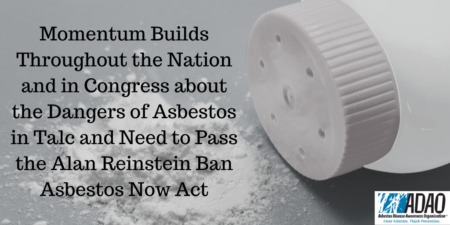Posted on January 31, 2020

The Asbestos Disease Awareness Organization (ADAO) will be attending and speaking at the public meeting on testing methods for asbestos in talc and cosmetic products containing talc held on February 4 by the U.S. Food and Drug Administration (FDA). According to the FDA, the “purpose of the public meeting is to discuss and obtain scientific data and information on topics related to testing methodologies, terminology, and criteria that can be applied to characterize and measure asbestos and other potentially harmful elongate mineral particles (EMPs) that may be present as contaminants in talc and consumer products, including cosmetics, containing talc as an ingredient.”
Asbestos contamination has been detected in crayons, children’s toys and other products used by kids and families, leading to several recalls of products over the last few years. Personal care giant Johnson & Johnson made headlines last year when they recalled their famous baby powder after the FDA found asbestos in samples of the powder. Cosmetics company Claire’s recalled products twice in one month after testing found asbestos contamination in its makeup products.
According to a recent study, “Mesothelioma Associated With the Use of Cosmetic Talc,” published in the Journal of Occupational and Environmental Medicine, “Exposure to asbestos-contaminated talcum powders can cause mesothelioma. Clinicians should elicit a history of talcum powder usage in all patients presenting with mesothelioma.” The study was conducted by Jacqueline Moline, MD, MSc; Kristin Bevilacqua, MPH; Maya Alexandri, JD; Ronald E. Gordon, PhD.
The FDA public meeting will take place on February 4, 2020 from 8:30am to 5:00pm EST, at the FDA’s headquarters in Silver Spring, Maryland. You can register for the event here. There will also be a live webcast for those who cannot attend in person.
The FDA writes that topics to be discussed include:
- “a federal interagency working group’s preliminary recommendations related to terminology and definitions of asbestos and other EMPs of health concern; and
- scientific data and information related to methodologies, terminology and criteria that can be used in the development of standardized testing methods to improve sensitivity, consistency, and inter-laboratory concurrence of asbestos testing.”
This is not the first time the FDA has raised awareness about the danger of asbestos. During a hearing on December 2, 2019, Susan Mayne, Ph.D., Director of the Center for Food Safety and Applied Nutrition at the FDA, testified that “asbestos is a known carcinogen so there is no safe level of asbestos in talc.” Following this hearing, the U.S. House of Representatives Subcommittee on Economic and Consumer Policy held a second hearing that week on Tuesday, December 10, 2019, entitled “Examining Carcinogens in Talc and the Best Methods for Asbestos Detection.”
This new public meeting called by the FDA, on top of the multiple hearings held at the end of last year, make it clear that there is an ever-growing interest in protecting the health and safety of American consumers. ADAO has been focused on prevention and policy for 15 years, as shown through our bill, the Alan Reinstein Ban Asbestos Now Act (ARBAN). Together we have taken numerous landmark steps forward, the passage of ARBAN would be historic, long-overdue progress in eliminating the importation and use of asbestos, which has caused hundreds of thousands of deaths in the U.S.
The bill is an amendment to the 2016 Toxic Substances Control Act (TSCA), and therefore would not apply to cosmetics, which are not subject to TSCA and are instead within the jurisdiction of the FDA. ARBAN only applies to asbestos imports, manufacturing, processing, use and distribution in commerce that are regulated under the Toxic Substances Control Act (TSCA). The asbestos definition in ARBAN is not intended to influence the actions FDA takes to address talc cosmetic issues.
By setting public hearings such as the one planned for February 4, the FDA is showing Americans that they are taking containment of consumer products seriously. Combined, the efforts by the FDA and the passing of ARBAN will make America infinitely safer for everyday consumers. The time to protect the public health and safety of all citizens is now.
I look forward to sharing our position and information during the FDA meeting on World Cancer Day!
Together, we can make a difference.
In unity,
Linda Reinstein
Social Networks
